|
|
|
Sort Order |
|
|
|
Items / Page
|
|
|
|
|
|
|
| Srl | Item |
| 1 |
ID:
191865
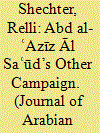

|
|
|
|
|
| Summary/Abstract |
This article focuses on the propaganda campaign that advisors to ʿAbd al-ʿAzīz Āl Saʿūd (“Ibn Saud”) –– emir, later sultan, of Najd and, later again, king of Najd and Hijaz, and finally king of Saudi Arabia –– engaged in between 1918 and 1932. It argues that this prolonged campaign was as crucial to the establishment of the state as the sultan’s military conquest of the land. I term this a “campaign” because it was a connected attempt, having constant, clear messages emphasising ʿAbd al-ʿAzīz’s positive leadership qualities, his reformist, modernising intent, and a positive representation of Wahhabism. It also disparaged his enemies and emphasised the natural unity of his recently conquered land. The campaign was central to persuading regional and global powers of the viability of ʿAbd al-ʿAzīz’s state-making project, and later, to gaining official diplomatic recognition of the Saudi state. The article studies this unfolding campaign through analysis of autobiographies, memoirs, travel and history books and articles written by ʿAbd al-ʿAzīz’s advisors; critical engagement with recent ample information on these advisors found on Saudi websites and in Saudi history books and the press; and US diplomatic correspondence.
|
|
|
|
|
|
|
|
|
|
|
|
|
|
|
|
| 2 |
ID:
191866
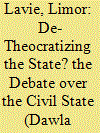

|
|
|
|
|
| Summary/Abstract |
Since the Arab uprisings, the ambiguous notion of a civil state (dawla madaniyya) has been gaining a foothold in many Arab states as the ideal state model, at the official and popular levels. Even Saudi Arabia has heard voices advocating a civil state. Whereas such voices were evident in critical newspaper columns, which raised countercriticism by the Saudi religious orthodoxy during the 2000s and 2010s, recently Crown Prince Muḥammad bin Salmān Āl Saʿūd has been increasingly portrayed in the Saudi media as directing the Kingdom toward a modern Islamic civil state, indicating a possible change in the perception of this concept. This article offers a contextual analysis of the Saudi intellectual polemic on the civil state model, which has been taking place for the past fifteen years, its development, meanings, and prospects. The article will also consider the implications of the long-standing debate over the civil state idea taking place in Egypt on the short-lived Saudi contestation, in an effort to enhance the overall understanding of the conception of the civil state in the Arab world.
|
|
|
|
|
|
|
|
|
|
|
|
|
|
|
|
| 3 |
ID:
191868
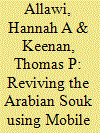

|
|
|
|
|
| Summary/Abstract |
This article discusses the outcomes of a Focus Group thematic analysis that revolved around the topic of using mobile Augmented Reality (AR) technology to help revive the Arabian Souk. The Old Souk of the city of Abu Dhabi was utilized as a case study for revival, using AR for a new form of smart tourism for the city. Major themes revealed both intangible and tangible elements through a variety of shops, products and personal experiences from those who have visited the Old Souk. The themes were then turned into an AR experience, in the form of three-dimensional (3D) computer-aided models, to aid in experiencing the once existing Old Souk on its original site today. This article points to the potential of recreating the Arabian Souk using AR technology as part of the Arabian Gulf’s smart tourism experience.
|
|
|
|
|
|
|
|
|
|
|
|
|
|
|
|
| 4 |
ID:
191863


|
|
|
|
|
| Summary/Abstract |
This qualitative feminist study sheds light on women’s shifting identities, struggles, and resistances in the most conservative Gulf state, Saudi Arabia, unpacking the shifting socio-political and mediated environments in this country and their impact on gendered activism. Through conducting in-depth interviews with ten Saudi women activists, journalists, and writers, this study investigates Saudi women’s multiple feminisms and activisms, as they are expressed and enacted by different women using the phenomenon of “cyberactivism”, and its sister phenomenon of “cyberfeminism”, to participate in the waves of socio-political transformation in the volatile Gulf region. In discussing how Saudi women are leveraging social media to advance their agendas, amplify their voices, highlight their demands, and enact new forms of leadership, agency, and empowerment, the double-edged sword effect of social media is unpacked. Adopting a postcolonial feminist approach, this study examines the potentials, challenges, and paradoxes of using social media to advance Saudi women’s rights in a rapidly shifting state.
|
|
|
|
|
|
|
|
|
|
|
|
|
|
|
|
| 5 |
ID:
191864
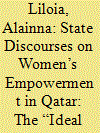

|
|
|
|
|
| Summary/Abstract |
This article analyzes contemporary state discourse on women’s empowerment in Qatar as embodied in state documents, government-run public relations campaigns, and the media output of state-run or state-sanctioned institutions. Through the lens of critical discourse analysis, the article demonstrates how the Qatari state’s political rhetoric conflates women’s professional advancement with national progress and constructs the “ideal Qatari woman” as a neoliberal feminist subject. With particular attention to the rhetoric found in the state-run magazine Q Life, the article argues that the Qatari state is promoting a model of women’s empowerment that merges transnational paradigms of neoliberal feminism with nationalist ideals of loyalty and patriotism and presents the ideal “Qatari woman” as a neoliberal feminist subject who contributes to her state’s national development through her own professional development and fulfillment.
|
|
|
|
|
|
|
|
|
|
|
|
|
|
|
|
| 6 |
ID:
191867
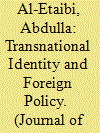

|
|
|
|
|
| Summary/Abstract |
The 2017 Gulf crisis has been largely framed as a diplomatic and economic one. However, the involvement of tribal identity in the foreign policy responses of Gulf states also made it a socio-political crisis. This paper adopts role identity theory as a framework for analysing how domestic politics and culture shaped international relations among GCC states during the crisis. According to this framework, tribal identity becomes operative in foreign policy when states can present themselves as fulfilling roles that distinguish them within a regional or international state system. Gulf states adopted new role identities defined in terms of tribe and tribal identity that then shaped the formulation and implementation of their diplomatic policies. During the crisis, Saudi Arabia adopted the role identity of tribe protector to undermine sovereign boundaries. The Qatari government on the other hand adopted the role of national unifier, rejecting tribal identity and ideologies. The implications of mobilising tribes are examined from the regime survival perspective, particularly scrutinising the gradual consolidation of the Qatari national identity to reduce risks posed to the regime.
|
|
|
|
|
|
|
|
|
|
|
|
|
|
|
|
|
|
|
|
|